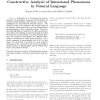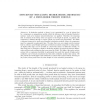254 search results - page 13 / 51 » Answer Sets for Propositional Theories |
AMAI
2006
Springer
13 years 7 months ago
2006
Springer
In this work, we introduce a new framework able to deal with a reasoning that is at the same time non monotonic and uncertain. In order to take into account a certainty level assoc...
ENGL
2007
13 years 7 months ago
2007
Abstract— Chierchia [2, 3, 4], pointed out the inadequacy of Montague’s approach in the analysis of certain natural language constructions, such as nominalization and propositi...
ATAL
2010
Springer
13 years 8 months ago
2010
Springer
One of the most challenging aspects of reasoning, planning, and acting in a multi-agent domain is reasoning about what the agents know about the knowledge of their fellows, and to...
LPNMR
1999
Springer
13 years 12 months ago
1999
Springer
This paper continues the line of research on representing actions, on the automation of commonsense reasoning and on planning that deals with causal theories and with action langua...
CORR
2008
Springer
13 years 6 months ago
2008
Springer
In deduction modulo, a theory is not represented by a set of axioms but by a congruence on propositions modulo which the inference rules of standard deductive systems--such as for ...


